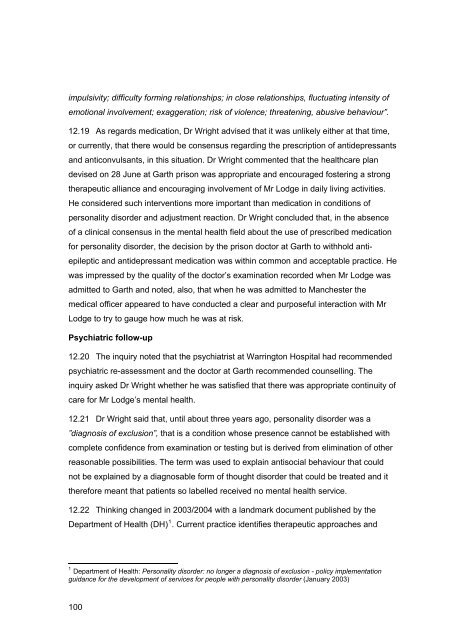Report of the Inquiry into the circumstances of the Death of Bernard ...
Report of the Inquiry into the circumstances of the Death of Bernard ...
Report of the Inquiry into the circumstances of the Death of Bernard ...
Create successful ePaper yourself
Turn your PDF publications into a flip-book with our unique Google optimized e-Paper software.
impulsivity; difficulty forming relationships; in close relationships, fluctuating intensity <strong>of</strong><br />
emotional involvement; exaggeration; risk <strong>of</strong> violence; threatening, abusive behaviour”.<br />
12.19 As regards medication, Dr Wright advised that it was unlikely ei<strong>the</strong>r at that time,<br />
or currently, that <strong>the</strong>re would be consensus regarding <strong>the</strong> prescription <strong>of</strong> antidepressants<br />
and anticonvulsants, in this situation. Dr Wright commented that <strong>the</strong> healthcare plan<br />
devised on 28 June at Garth prison was appropriate and encouraged fostering a strong<br />
<strong>the</strong>rapeutic alliance and encouraging involvement <strong>of</strong> Mr Lodge in daily living activities.<br />
He considered such interventions more important than medication in conditions <strong>of</strong><br />
personality disorder and adjustment reaction. Dr Wright concluded that, in <strong>the</strong> absence<br />
<strong>of</strong> a clinical consensus in <strong>the</strong> mental health field about <strong>the</strong> use <strong>of</strong> prescribed medication<br />
for personality disorder, <strong>the</strong> decision by <strong>the</strong> prison doctor at Garth to withhold antiepileptic<br />
and antidepressant medication was within common and acceptable practice. He<br />
was impressed by <strong>the</strong> quality <strong>of</strong> <strong>the</strong> doctor’s examination recorded when Mr Lodge was<br />
admitted to Garth and noted, also, that when he was admitted to Manchester <strong>the</strong><br />
medical <strong>of</strong>ficer appeared to have conducted a clear and purposeful interaction with Mr<br />
Lodge to try to gauge how much he was at risk.<br />
Psychiatric follow-up<br />
12.20 The inquiry noted that <strong>the</strong> psychiatrist at Warrington Hospital had recommended<br />
psychiatric re-assessment and <strong>the</strong> doctor at Garth recommended counselling. The<br />
inquiry asked Dr Wright whe<strong>the</strong>r he was satisfied that <strong>the</strong>re was appropriate continuity <strong>of</strong><br />
care for Mr Lodge’s mental health.<br />
12.21 Dr Wright said that, until about three years ago, personality disorder was a<br />
”diagnosis <strong>of</strong> exclusion”, that is a condition whose presence cannot be established with<br />
complete confidence from examination or testing but is derived from elimination <strong>of</strong> o<strong>the</strong>r<br />
reasonable possibilities. The term was used to explain antisocial behaviour that could<br />
not be explained by a diagnosable form <strong>of</strong> thought disorder that could be treated and it<br />
<strong>the</strong>refore meant that patients so labelled received no mental health service.<br />
12.22 Thinking changed in 2003/2004 with a landmark document published by <strong>the</strong><br />
Department <strong>of</strong> Health (DH) 1 . Current practice identifies <strong>the</strong>rapeutic approaches and<br />
1 Department <strong>of</strong> Health: Personality disorder: no longer a diagnosis <strong>of</strong> exclusion - policy implementation<br />
guidance for <strong>the</strong> development <strong>of</strong> services for people with personality disorder (January 2003)<br />
100
















